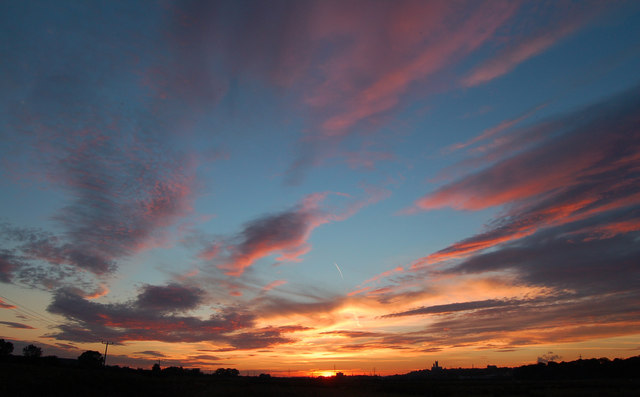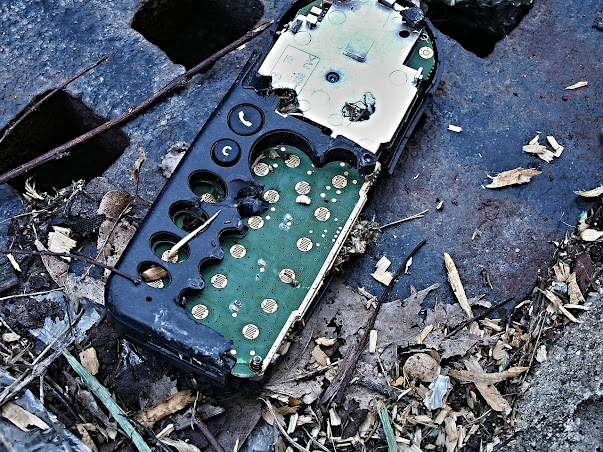My Greatest Regret
Until a few years ago my greatest regret was always that I didn't jump off the runaway train of my medical career. I almost wrote 'before it crashed', because that's where the train is going. The inner struggle appeared to be about whether to live the life my mother wanted for me, or the hypothetical one that I would have had if she hadn't had two doctors as parents. She had refused to follow them into the family business, believing she would cry if she had a patient who was going to die. So somehow the baton passed to the next generation, and everyone agreed it had to be handed to me.
I was often to be found in the open train doorway looking at the grass-is-greener countryside speeding past, but I didn't jump. When I investigated some of the more obvious professional alternatives it just looked like a different kind of hell out there. One where profits mattered more. And wearing business suits and playing a corporate game seemed to be unavoidable. Better the idealistic hell than the venal one.
In fact that isn't really an accurate representation of my career. It did repeatedly crash. I've lost count of the times I left work one day and couldn't go back. For the first year or two of medicine I dwelt on the obvious parallels with techniques to psychologically destabilise enemy spies: sleep deprivation, social isolation, sudden loud noises and mutually exclusive demands at unpredictable times of the day and night, arbitrary criticism, an unassailable power differential and unreliable food. These and the guilt I felt about the enormous gulf between my responsibility and minimal skill led inevitably to emotional decompensation. I would suddenly be unable to stop myself crying. Overwhelm I suppose you'd call it nowadays. I sometimes tried to slow down and reduce the pressure on myself for a while. But, well, people's lives did actually depend on me.
And while I was sometimes in the open doorway of the train thinking about jumping off it, more often I was climbing back on despite my conflicted feelings because I believed the alternative would be just as difficult because wherever I went, I would still be me. My colleagues tended to try to dissuade me, from a world view that didn't really see any alternative path. And my non-medical friends couldn't see the problem, hidden behind the respect and the pay and the guarantee of work for as long as I wanted it.
Medicine is a good career. And virtuous almost by definition. And I learned so many things about life and people by staying in it.
At Thanet District General Hospital, when I was doing my first House Officer posting, the most junior of the junior doctors, one of my patients died in the first week of the job. It was October, and Margate at that time of year is a damp cold place which I had yet to see.
I had spoken to Margaret of course on the first or second day of the job. Introduced myself quietly out of respect for her frail state. She was an old white woman, pale and wrinkled with age spots, sitting up on the pillows, lips a mauve colour from the lack of oxygen getting to her blood. It must have been an effort to breathe, but she smiled, said hello, answered my foolish questions as best she could and submitted to my drawing back the crinkled skin of her arm and sticking a needle into the vein in her elbow. The blood seeps out of the hole in old skin in a different way, as if the body isn't grasping to preserve it any more.
I was woken in the nadir of the night by the crash call. A particularly jarring note coming through my pager. My body got me from sleep to standing in one jerk and the panic sent me out and jogging through the hospital courtyard to the ward before I had a chance to think. I could feel my chest struggling at the sudden change from lying to running. I could see my breath in the cold air and I was glad of the white coat, holding my pockets to stop the stethoscope and handbook falling out. I couldn't catch my breath. It was lucky I had been so tired I hadn't changed out of my clothes.
When I got to the ward the curtains were drawn around Margaret's bed. The other beds were in darkness, but I could hear rustling and see the glint of curious eyes. I pushed through the gap in the curtains, panting.
An unfamiliar woman in dark blue Sister's uniform was doing CPR and when I arrived nodded at me.
'Here, you do the chest compressions.' I was relieved, that was something I could do. I moved to the opposite side of the bed and kicked the pillow underneath it so I could get a good angle.
Margaret's caved in body was there but she wasn't. I focussed on getting my hands into position on her chest between the deflated breasts, the leverage of my bodyweight on my straight arms to give myself the best chance of massaging her heart with her ribcage. Trying not to worry about breaking those frail ribs in the process of saving her life. Trying to get the rhythm and pace right. Trying to remember my training.
On television such moments are high in dramatic tension with a heroic flavour to them. In real life it's a complex technical exercise that will succeed in only about a quarter of people. It doesn't feel heroic at all.
The nurse was pinching Margaret's nose, the other palm lifting her chin, breathing into her mouth. I was so new that I didn't realise that being the only doctor there I was automatically in charge. In between breaths the Sister turned her head away from Margaret's face to talk to me.
'Can you intubate?' She was wide awake at three in the morning, while my brain was having trouble doing anything but keep me pumping the blood round Margaret's body.
I shook my head. I knew how, but I hadn't practiced on a real person.
'Me either.'
The Senior Registrar arrived at the moment the nursing assistant rolled the resus trolley through the curtains. The doctor was beautiful, smooth and leggy. She wasn't out of breath at all, and to my relief took charge straight away. After an ECG, some shocks, an injection, ordered from her standing position beyond the institutional bedside table, she stood straighter and said,
'I'm calling time of death.' We nodded ruefully. No more we could do. She'd been dead when we got there. '4.12am.' She wrote it on the lined paper in the tatty cardboard file.
I stood up and the tension in my shoulders and neck dropped away. And the realisation flowed in that this doctor had stopped long enough to make up her face before walking elegantly to the resuscitation. I simply couldn't compute.
After the morning ward round the next day, no the same day six hours later, I found Margaret's son and daughter-in-law inside the curtains looking at the remade empty bed. I had interrupted their quiet conversation.
'Oh! Ah...I'm so sorry we weren't able to save her.'
'It isn't really a surprise.' He looked at his wife and she, sitting on the bed now, looked at him. There was something they had been talking about when I came in.
I thought I couldn't just leave it there. I should say something about his mother.
'I only spoke to her a few times but I thought she was a very nice lady.' To my embarrassment tears were forming in my eyes as I spoke, and breaking my voice. 'Oh, sorry.' I wiped my eyes and shook my head as if that would erase the emotional leakage that had just happened.
He got up. 'No, don't apologise, it's good to see you care.' They both smiled at me and we shook hands. I think the first tears were tiredness more than sympathy, but the second tears were because they were kind to me, a stranger, at such a moment of loss for them.
From a hundred little moments like that I learned that the kindness of my earth-mates touches me deeply. I learned that you can work through your limits when someone else needs you to - that kindness is a sort of power source. I learned that I know nothing, but that the little I know can change people's lives. And I learned the unexpected energy that comes from nowhere when you're doing the right thing in the right way. I learned so many things about life and death and living. And I don't believe I would have got to this point if I hadn't been working in the boundarylands between life and death, between sanity and madness. How could I have learned so much in any other kind of job? So however hard it was, and however much I suffered from doing it, I can't regret it now.
.jpg)


Comments
Post a Comment
Tell me what you think about this idea, your experiences, or just what comes to mind when you read this.